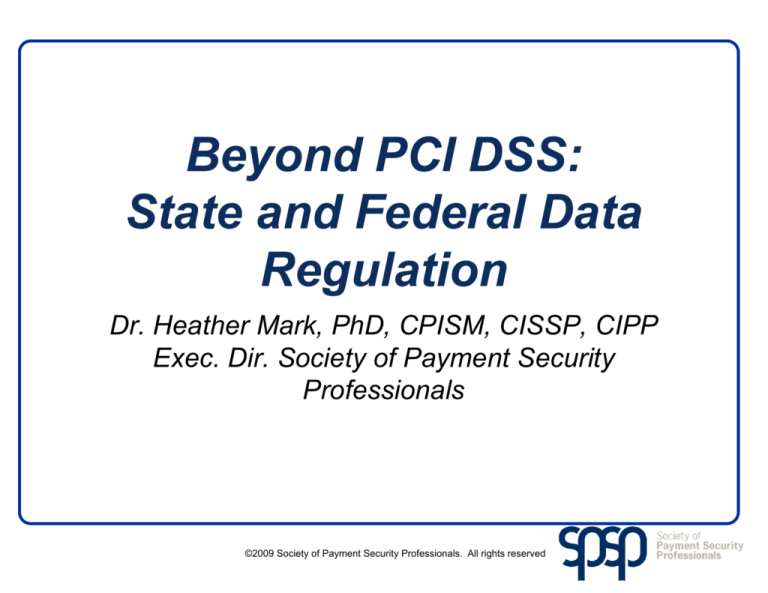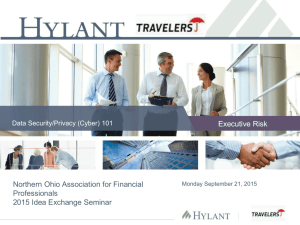
Beyond PCI DSS:
State and Federal Data
Regulation
Dr. Heather Mark, PhD, CPISM, CISSP, CIPP
Exec. Dir. Society of Payment Security
Professionals
©2009 Society of Payment Security Professionals. All rights reserved
Agenda
• Brief Overview of the Policy Process
• Why does Government Get Involved
• Current Environment
• Breaches, Identity Theft and Public Perception
• Limitations of PCI DSS
• Limited Focus, Static Standard
• State & Federal Regulations
• Protected Data, Protections Required
• Addressing Regulation through IT Governance
©2008 Society of Payment Security Professionals. All rights reserved
2
Policy Process
• Three Relevant Theories of Public Policy at Play
• Issue Attention Cycles - the more the public pays
attention, the more likely legislators are to pay attention
• Incrementalism - nothing new in public policy; legislation
by baby step
• Punctuated Equilibrium - crisis leads to rapid legislation
containing significant changes
Listen to those Congressmen arguing! Is all that discussion
and debate about you?
-Schoolhouse Rock, “I’m Just a Bill.”
http://www.school-house-rock.com/Bill.html
©2008 Society of Payment Security Professionals. All rights reserved
3
Theories in Practice
• In applying the Theory:
• Issue Attention Cycle
• We are squarely in the “Alarmed Discovery Stage”
• Incrementalism
• Have used this theory in creating a sectoral, piecemeal privacy lattice
• Privacy and security regulation leaves serious gaps in some areas and overlaps in
others
• Government has tried to extrapolate existing legislation rather than creating new policy
•Federal Trade Commission Act §5a
• Punctuated Equilibrium
• Knee-jerk reactions at the state level include breach notification laws, among others
©2008 Society of Payment Security Professionals. All rights reserved
4
Government Involvement in Privacy
• “ The right to be let alone...”
• Definition has shaped public policy towards privacy since
-Samuel Warren and Louis Brandies
the early 20th century
• Public Policy was not (still is not) equipped to deal with “the
connected” world in which data serves as currency
• Public policy typically deals with traditional privacy issues
• telephone conversations
• photographs
• Result is a sectoral approach to data privacy
©2008 Society of Payment Security Professionals. All rights reserved
5
Why Does Government Care?
• Consumer Privacy
• government does not care if websites are vandalized, but
if customer privacy is compromised
• Consumer Confidence
• uncertain consumers become infrequent consumers witness current economic situation
• Unfair and Deceptive Trade Practices
• Privacy of Children
©2008 Society of Payment Security Professionals. All rights reserved
6
Current Data Environment
• Recent reports indicate that data breaches have increased
almost 50% over the previous year
• Organized criminal enterprises targeting repositories of
personal information
• Payment card information AND personally identifiable
information are equally vulnerable and equally targeted
• Identity theft and financial fraud are growing concerns
• media has put forth the idea that payment card fraud is
equivalent to identity theft
• Focus on standards instead of addressing risk
©2008 Society of Payment Security Professionals. All rights reserved
7
Limitations of PCI DSS
• PCI DSS is a catalyst for what should be the larger discussion
surrounding the protection of consumer data, but not the mechanism
for complete protection
• Focus is solely on payment card information
• Failure to look beyond payment card information increases risk of
exposure of personal information
• Static Standard in a Dynamic Environment
• Any static, prescriptive standard is necessarily limiting
• infrequent updates mean compliance does not always address risk
• Compliance with PCI DSS may not mean compliance with laws
©2008 Society of Payment Security Professionals. All rights reserved
8
State & Federal Legislation
• State Breach Notification Laws
• Minnesota Plastic Card Security Act
• Massachusetts Standards for the Protection of Personal
Information of Residents of the Commonwealth
• Nevada Encryption Law
• Proposed State Laws and Amendments
• Federal Trade Commission Act
©2008 Society of Payment Security Professionals. All rights reserved
9
State
Breach Notification Laws
• More than
45 states now have breach notification laws
• many important definitions vary from state to state
•
“trigger,” “notification,” “breach”
• Require notification of affected individuals in the event of a
compromise (or suspected compromise) of Personally Identifiable
Information (PII)
• Common definition of PII includes:
• First name or initial and last name in conjunction with
•
•
•
social security number
driver’s license number or state ID number
financial account number, credit or debit card number and password or PINs that will allow someone to
access the account
• It is possible to have an Account Data Compromise under PCI DSS
that does not invoke state breach notification requirements and vice
versa
©2008 Society of Payment Security Professionals. All rights reserved
10
Minnesota Plastic Card Security Act
• Codifies card brand prohibition on storage of sensitive authentication
data
• Impacts anyone “doing business in the state of Minnesota”
• Those found in violation of the law can be held accountable according
to the following
• processing more than 20,000 transactions annually - can be held
responsible for re-issuance costs, notification costs, damages paid to
affected consumers and private right of action
• processing fewer than 20,000 transactions annually - can be held
accountable to private right of action
• Holds merchants accountable for compliance of their service providers
©2008 Society of Payment Security Professionals. All rights reserved
11
MA Data Protection Law
• Recent Accompaniment to the MA data breach law
•note that MA defines compromise as an exposure of
data that includes first name (or initial) and last name in
conjunction with ssn, driver’s license numbers or account
numbers. It does not require the exposure of passwords
or account access codes.
• Effective date recently extended from Jan 1, 2009 until
May 1, 2009 (same date as Red Flag clause extension)
• Most prescriptive state level data protection requirements
to date
• Applies to any company storing data on any MA Resident
©2008 Society of Payment Security Professionals. All rights reserved
12
MA Security Requirements
Security Program Requirements
System Security Requirements
Data Inventory
Encrypt personal information stored on laptops and portable
devices, transmitted wirelessly or over public networks
Limits on Data Retention
Secure user authentication protocols, access
control measures, and unique user ids
Restrict Access to Need to Know
Monitor systems for unauthorized access or use of
personal information
Contractually Obligate Service
Providers
Anti-virus and patching must be “reasonably up-todate”
Develop, Document, Implement
Security Policies - impose penalties
for violations
Firewall must be “reasonably up-to-date”
Document Response to Security
Incidents
Employee Training
©2008 Society of Payment Security Professionals. All rights reserved
13
Nevada Encryption Law
• Nevada passed law last year, became effective October, 2008
• Requires ALL TRANSMISSIONS of personal data outside the
“secure systems of the business” to be encrypted
• Personal Data is defined as “first name or initial and last name in
conjunction with financial, credit or debit card account and
password or other security code that would allow access to those
accounts.”
• NV Definition of Encryption
•
“any protective or disruptive measure including but not limited to cryptography, enciphering,
encoding, or a computer contaminant to (1)prevent, impede, delay or disrupt access to any
data...(2)cause or make any data, information, image, program, signal or sound unintelligible or
unusable or (3)prevent, impede, delay or disrupt, the normal operation or use of any component,
device, equipment, system or network.”
©2008 Society of Payment Security Professionals. All rights reserved
14
Proposed Laws & Amendments
• PCI DSS-related Laws
• Florida, Michigan, Indiana, Washington, Texas and
others proposing legislation that would codify parts of PCI
DSS
• California Proposed Amendment to Breach Law
• breaches affecting more than 500 individuals to be
reported to state AG
• reports indicate that less than 10% of breaches are being reported
• specify what must be included in breach notification to
individuals
• Recently amended to include health care information
©2008 Society of Payment Security Professionals. All rights reserved
15
Federal Legislation - FTC
• Federal Trade Commission §5A
• “The Commission is hereby empowered and directed to prevent persons, partnerships, or
corporations...from using unfair methods of competition in or affecting commerce and
unfair or deceptive acts or practices in or affecting commerce.” – 15USC§45(a)(1)
• How is it used in the context of a data breach?
• Posting a privacy policy and failing to adhere to that policy is a deceptive practice
• “information practices that cause substantial harm to the consumer” are unfair practices
• FTC can require a number of actions in the wake of a data
compromise
• injunction on business practices
• penalties, customer redress
• government oversight of information security and privacy programs for
up to 20 years
©2008 Society of Payment Security Professionals. All rights reserved
16
Compliance First or Security First?
• Managing compliance with state, federal and industry regulation is like
fighting the hydra
• Chasing compliance is a haphazard, inconsistent approach to data
protection
• Prioritized Approach? - Start with protecting the data
• protect from the inside out
• address security through a strong IT governance program that
addresses all classes of regulated data
•
Risk analysis - design and implement controls commensurate with the risk in your environment
•
Regularly test and monitor for new vulnerabilities and respond to new potential exploits
•
ex - we know that malware is capturing data in transit over internal networks, so encrypt traffic on the internal
network
• Compliance alone is NOT enough to protect data
Image "Hydra" created on 08 June 1997; last modified on 05 December 1999. http://www.pantheon.org/areas/gallery/mythology/europe/greek_people/hydra.html © MCMXCV MMVI Encyclopedia Mythica™. All rights reserved.
©2008 Society of Payment Security Professionals. All rights reserved
17
IT Governance and Compliance
• Security is Compliance, but compliance is not always secure
• any given, prescriptive standard is static and therefore somewhat
lacking in proactive controls and processes
• Compliance alone does not account for the objectives and needs
of the business
• IT Governance
• Supports Business Objectives (financial, compliance, etc)
• Involves Cross-Functional teams of executives, managers, etc
• Controls Risks
• Enhances Performance/Operations
©2008 Society of Payment Security Professionals. All rights reserved
18
Conclusions
• Rate of new regulation makes chasing compliance detrimental to
security, IT operations and business objectives
• Compliance alone is not enough to protect data from exposure or
your company from liability
• Regulation is a fact of life and it’s better to be proactive than
reactive
• Robust IT Governance can help achieve
• Security
• Compliance
• IT Risk Management
©2008 Society of Payment Security Professionals. All rights reserved
19









